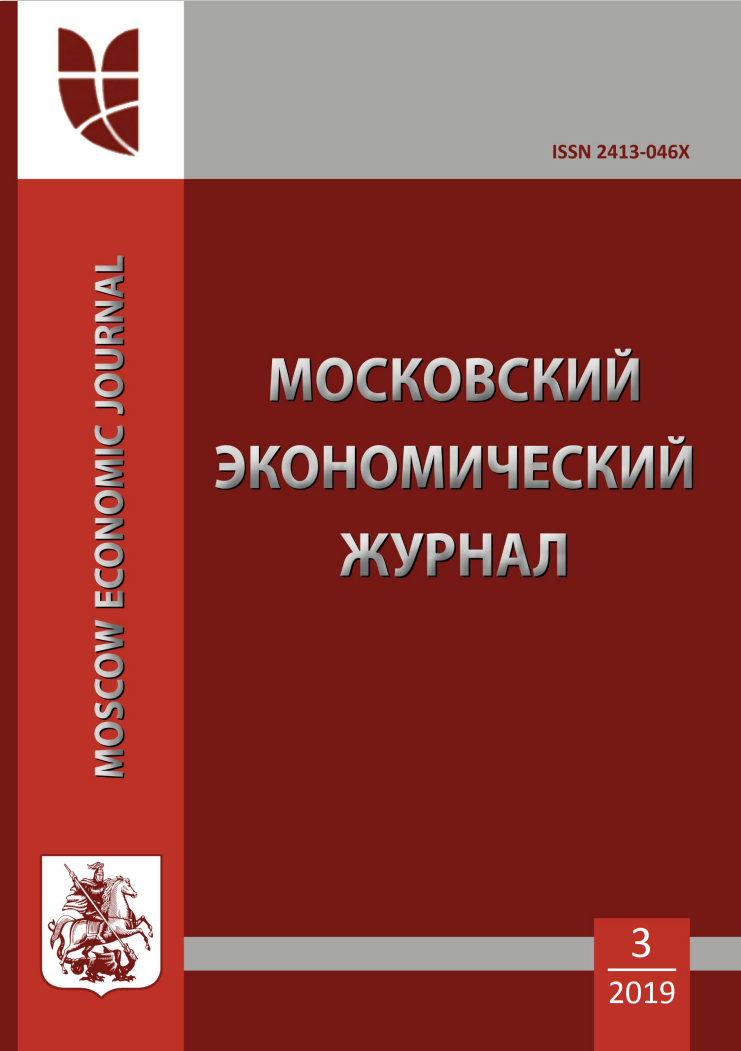Russian Federation
Russian Federation
Russian Federation
Russian Federation
This article aims to create methodology by which we can explain implementation of Russian development strategy. Authors used statistical data of Federal State Statistics Service for preparing this article. Was used software Statistica for calculations. This article includes: specific features of the state system in Russia; problems of regional development including their social and economic differences; the historical reasons owing to regional economy be crisis; article says why we need to change something for increase life expectancy at presently; authors selected multiple regression method for answer how to increase life expectancy in Russia and execute May Edict of mister President, how is it possible? Results of this exploring proved that between lifetime indicator and other social and economic indicators are causality dependent. Due to multiple regression method was create working model on which you can forecasting lifetime expectancy rate in Russian Federation. Authors convince oneself that lifetime expectancy people who live in Russian Federation may be 78 years instead of 72 years. In the end was illustrate that presidential decrees, which were given to The Russian Government in may 2018, can be fulfil in real. The shortcomings of statistical modeling of government decisions are proposed for discussion. This is one of the important aspects of article. Based on the results of the work carried out, the possibility of forming a methodological apparatus that will statistically justify the implementation of the strategic objectives of the development of the Russian Federation for the period up to 2024 is brought to the discussion. Conclusions of this research can be used at regional state and municipal state, in future.
regional economy, Russian regions, region economic potential, interregional comparisons, statistical methods researching, regression analysis, quality of lifetime, lifetime expectancy, demography, economic growth strategy
1. Burov M. P., Gorbunov V. S. K voprosu o metodologii formirovaniya strategii razvitiya nacional'noy ekonomiki // Ekonomika i predprinimatel'stvo. 2017. № 4-1 (81). S. 114-121.
2. Burov M. P., Gorbunov V. S. Sovershenstvovat' upravlyayuschee vozdeystvie na razvitie territoriy // Zemleustroystvo, kadastr i monitoring zemel'. 2017. № 9 (152). S. 5-13.
3. Burov M. P., Margalitadze O. N. Investicionnyy klimat v Rossii: suschestvuyuschee polozhenie i problemy forsirovannogo rosta investiciy v razvitie territoriy i modernizaciyu ekonomiki // Zemleustroystvo, kadastr i monitoring zemel'. 2017. № 2 (145). S. 11-18.
4. Burov M. P., Margalitadze O. N. Uluchshat' investicionnyy klimat v Rossii i forsirovat' privlechenie investiciy v nauchno-tehnologicheskoe razvitie strany // Ekonomicheskie sistemy. 2016. № 4. S. 54-56.
5. Burov M.P. Gosudarstvennoe regulirovanie nacional'noy ekonomiki. Sovremennye paradigmy i mehanizmy razvitiya Rossiyskih regionov M.: Dashkov i Ko, 2018. 342 s.
6. Volkov S., Fomin A., Cherkashina E., Cherkashin K. Zemleustroitel'noe obespechenie perehoda ot kategorii zemel' k territorial'nomu zonirovaniyu v Rossiyskoy Federacii Land relations and land management // Mezhdunarodnyy sel'skohozyaystvennyy zhurnal. 2015. № 5. S. 3-8.
7. Germanovich A.G. Rol' regional'nyh agroklasterov v obespechenii ustoychivogo razvitiya sel'skih territoriy // Innovacii i investicii. 2018. № 5. S. 358-361.
8. Germanovich A.G. Razvitie klasternoy regional'noy ekonomiki v RF // Innovacii i investicii. 2015. № 7. S. 26-28.
9. Efremova L.B., Efremov A.A. Rol' prirodno-resursnogo potenciala v razmeschenii sel'skohozyaystvennogo proizvodstva i ego effektivnosti / L.B. Efremova, A.A. Efremov // Zemleustroystvo, kadastr i monitoring zemel'. 2009. № 6 (54). S. 32-37.
10. Efremova L.B., Efremov A.A. Ustoychivost' sel'skohozyaystvennogo proizvodstva neobhodimoe uslovie prodovol'stvennoy bezopasnosti / L.B. Efremova, A.A. Efremov // Zemleustroystvo, kadastr i monitoring zemel'. 2010. № 8 (68). S. 75-78.
11. Ivanov N. I., Efremova L. B., Gorbunov V. S. Formirovanie ustoychivoy modeli razvitiya rossiyskih territoriy na osnove ispol'zovaniya sovremennyh metodov energoobespecheniya // APK: ekonomika, upravlenie. 2019. № 1. S. 69-75.
12. Ivanov N.I. Ekonomiko-pravovye predlozheniya po upravleniyu zemlyami sel'skohozyaystvennogo naznacheniya // Izvestiya Tul'skogo gosudarstvennogo universiteta. Ekonomicheskie i yuridicheskie nauki. Vyp. 3. Ch.2.Tula: Izd-vo TulGU, 2011.s. 70-78.
13. Ivanov N.I., Chemodin Yu.A. Povyshenie effektivnosti funkcionirovaniya teplichnyh hozyaystv na osnove vzaimodeystviya s avtomatizirovannymi kompleksami bezothodnoy utilizacii tverdyh bytovyh othodov // Moskovskiy ekonomicheskiy zhurnal. 2017. № 4. s. 55.
14. Korostelev S.P. Ustoychivoe razvitie territoriy i nalogooblozhenie nedvizhimosti // S.P. Korostelev / Zemleustroystvo, kadastr i monitoring zemel' M.: Izdatel'skiy dom «Panorama», №5, 2017. S. 32-39.
15. Nilipovskiy V. I., Nilipovskaya D.V. Stimulirovanie ekonomicheskogo rosta na osnove racional'noy sistemy prirodopol'zovaniya // Geo-Sibir'. 2007. t. 2. № 1. S. 93-97.
16. Prikladnoy menedzhment: uchebnoe posobie / Yu.A. Cypkin, N.I. Ivanov, A.S. Kokorev, A.A. Fomin. - M.: Nauchnyy konsul'tant. - 2018. - 440 s.
17. Radionov A.S. Effektivnyy menedzhment v APK v usloviyah importozamescheniya // Moskovskiy ekonomicheskiy zhurnal. 2016. № 4. C. 26-27.
18. Rubanov I., Fomin A. Posledstviya prisoedineniya k VTO dlya sel'skogo hozyaystva Rossii // Mezhdunarodnyy sel'skohozyaystvennyy zhurnal. 2014. № 3. S. 48-56.
19. Fomin A.A. Ocenka vliyaniya vstupleniya Rossii v VTO na sostoyanie agrarnogo kompleksa // Hleboprodukty. 2013. № 6. S. 4-7.
20. Fomin A.A. Uroki reform Petra Arkad'evicha Stolypina // Mezhdunarodnyy sel'skohozyaystvennyy zhurnal. 2017, №2. S. 6-7.
21. Fomin A.A., Rubanov I.N. Perspektivy importozamescheniya v otechestvennom sel'skom hozyaystve // Hleboprodukty. 2015. № 7. S. 6-7.
22. Hlopcov D. M., Gorbunov V. S. Zemel'nyy uchastok kak osnova ekonomiki goroda // monografiya; Minobrnauki rossii, federal'noe gos. byudzhetnoe obrazovatel'noe uchrezhdenie vyssh. prof. obrazovaniya "Kuzbasskaya gos. ped. akad." (FGBOU VPO "KuzGPA"). Novokuzneck, 2011.
23. Chemodin Yu. A., Gorbunov V. S. Metodologicheskie osnovy i mehanizmy ustoychivogo razvitiya territorii Rossii na regional'nom urovne. Moskva, 2018.
24. Chemodin Yu.A. Aktual'nye problemy Dal'nego Vostoka // Moskovskiy ekonomicheskiy zhurnal. 2018. № 4. s. 65.
25. Chemodin Yu.A. K voprosu osvoeniya zemel' severnyh rayonov Sibiri i Dal'nego Vostoka // Moskovskiy ekonomicheskiy zhurnal. 2018. № 1. s. 10.
26. Chirkova L., Al' Harfush Simon Ekonomicheskoe vzaimodeystvie gosudarstva i chastnogo sektora pri proizvodstve i realizacii sel'hozprodukcii v Sirii // Mezhdunarodnyy sel'skohozyaystvennyy zhurnal. 2007. № 1. s. 87-88.
27. Chirkova L.L. diversifikaciya osnovnyh napravleniy gosudarstvennogo regulirovaniya v APK // Zemleustroystvo, kadastr i monitoring zemel'. 2008. № 3 (39). s. 35-47.
28. Shagayda N.I., Fomin A.A. Vybor prioritetov zemel'noy politiki na Dal'nem Vostoke / / Mezhdunarodnyy sel'skohozyaystvennyy zhurnal, 2015. №1, S. 23-26.
29. Shevchenko T. V. Formirovanie i razvitie sistemy sbyta sel'skohozyaystvennoy produkcii otechestvennyh proizvoditeley // Vestnik Bashkirskogo gosudarstvennogo agrarnogo universiteta. 2015. №3 (35). S.141-145.
30. Papaskiri T.C., Nilipovsky V.I. The use of innovative technologies in land use planing education (table) // E&M euroeducation. 2009. № 2-3. S. 9-11.











